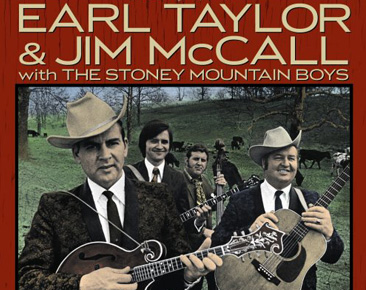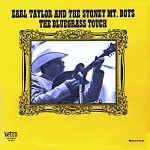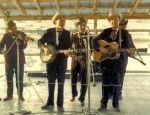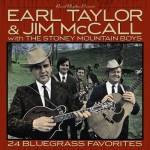
On January 28, 1984, soulful bluegrass singer and mandolin player Earl Taylor died.
Earl Taylor was born on June 17, 1929, in rural Rose Hill, Lee County, Virginia. He was the leader of one of the more significant traditional bluegrass bands from the late 1950s through to the early 1980s. Despite the fact that his various versions of the Stoney Mountain Boys played some of the finest bluegrass music, sadly Taylor never got the credit that he deserved.
In the late 1930s, Taylor was attracted to the music of the Monroe Brothers and was inspired to learn to play the mandolin and guitar. At the age of 12 he added the harmonica to his instrument case.
In 1946 he relocated to Michigan where he played with the Mountaineers, working in Toledo and nearby Monroe.
After a few months he formed the Stoney Mountain Boys, but by the end of 1948, he was broke and disenchanted with the music business, so he disbanded the group and returned to Virginia.
Subsequently, he settled in Rockville, Maryland, where he worked for a drywall company and stayed away from music for the next three years.
 He then became friendly with two 17 year olds, Charlie Waller (later of Country Gentlemen fame) and Sam ‘Porky’ Hutchins. wIn 1953 they moved to Baltimore adding fiddle player Louie Profitt to their entourage.
He then became friendly with two 17 year olds, Charlie Waller (later of Country Gentlemen fame) and Sam ‘Porky’ Hutchins. wIn 1953 they moved to Baltimore adding fiddle player Louie Profitt to their entourage.
With some changes, they played their local area until 1955, when Taylor joined Jimmy Martin in Detroit. While with Martin he helped to record some classic sides for Decca, before returning to Maryland in 1957, where he formed a new version of the Stoney Mountain Boys and worked the club circuit in the Baltimore area.
In April 1959, Earl Taylor and Stoney Mountain Boys had the distinction of being the first bluegrass band to play on the Carnegie Hall stage. They were the hit of the evening. Taylor recalled, “When we would end a number, I knew that it would take five minutes before we could go into another one – that was how much rarin’ and screamin’ and hair-pullin’ there was.”
Soon afterwards, he relocated to Cincinnati playing various venues and doing television and radio work until 1965.
In 1963 he recorded an album Blue Grass Taylor-Made for Capitol Records with his new band, The Blue Grass Mountaineers.
During this time, he recorded two sides for Rebel Records and an album for United Artists (Folk Songs From the Bluegrass) as well.
In 1964 Taylor worked as a sideman, playing mandolin and harmonica, for the Stanley Brothers during four sessions for the King albums Hymns of the Cross (KLP 918) and The Remarkable Stanley Brothers Play and Sing Bluegrass Songs for You (KLP 924).
 In June 1965 he re-joined Jimmy Martin, but his stay was brief as by August he had gone on to work for Flatt & Scruggs with whom he spent about 15 months touring and recording. He worked on four sessions, playing mandolin on cuts on that are included on the LPs When The Saints Go Marching In (CL-2513/CS 9313) and Strictly Instrumental (CL-2643/CS 9443).
In June 1965 he re-joined Jimmy Martin, but his stay was brief as by August he had gone on to work for Flatt & Scruggs with whom he spent about 15 months touring and recording. He worked on four sessions, playing mandolin on cuts on that are included on the LPs When The Saints Go Marching In (CL-2513/CS 9313) and Strictly Instrumental (CL-2643/CS 9443).
He later returned to Cincinnati, re-organised the Stoney Mountain Boys and recorded an album with guitarist Jim McCall, released by Rural Rhythm.
In May and October 1967 he helped Ralph Stanley record material for his first King album Brand New Country Songs (KSD-1028).
Subsequently, he took the band to California where he worked for several months and recorded an album for Vetco (The Bluegrass Touch, released five years later, in 1974).
In the early 1970s, Taylor and McCall returned to play the Cincinnati and Columbus area and made further recordings for Rural Rhythm and Vetco.
 However, in 1975 his own ill health and the tragic death of his young son saw him give up personal appearances for several months.
However, in 1975 his own ill health and the tragic death of his young son saw him give up personal appearances for several months.
He resumed playing in the early 1980s, for some of the time with McIntyre, led by the banjo-playing son of Vernon ‘Boatwhistle’ McIntyre, also name Vernon, before declining health severely limited his playing and finally led to his death, from a heart attack, in 1984.
Tom Ewing worked with Taylor before going on to be a Blue Grass Boy …..
“Earl Taylor was the first professional bluegrass musician I ever played with and I will always be indebted to him for putting up with me. I’ve heard stories of his heavy-drinking days, but when I knew him in the 1970s, he was “on the wagon,” with a ready sense of humor and a remarkably laid back way of handling every situation.
He went to Florida without me, hoping to find full-time picking at Disneyland, and his oldest son Billy died down there in a swimming accident. Earl came back to Cincinnati and kept right on going somehow — I’m sure I wouldn’t have been able to under those circumstances. But he couldn’t read or write, so, aside from his being a cool and wily trader, music was his primary way of making it. He had to keep on picking.”
This video features Earl Taylor and the Stoney Mountain Boys’ Short Life of Trouble from the 1991 album Mountain Music Bluegrass Style on Smithsonian Folkways.
The Stoney Mountain Boys included Duke of Bluegrass Banjo, Walt Hensley, Sam Hutchins on guitar, and the great Vernon ‘Boatwhistle’ McIntyre on bass.
Discography:
- Folk Songs from the Bluegrass (United Artists UAS-6049)
- Bluegrass Taylor Made (Capitol T/ST-2090)
- Bluegrass Favorites (Rural Rhythm RRET-188) with Jim McCall
- Bluegrass Favorites, Vol. 2 (Rural Rhythm RRET-242) with Jim McCall
- Bluegrass Favorites, Vol. 3 (Rural Rhythm RRET-243) with Jim McCall
- Bluegrass Touch (Vetco LP 3017) (Reissued on Crosscut CR 1013)
- Body And Soul (Vetco LP-3026) (Reissued on Crosscut CR 1020)
- Bluegrass Favorites (Rural Rhythm RHY-CD 320 24), with Jim McCall.








